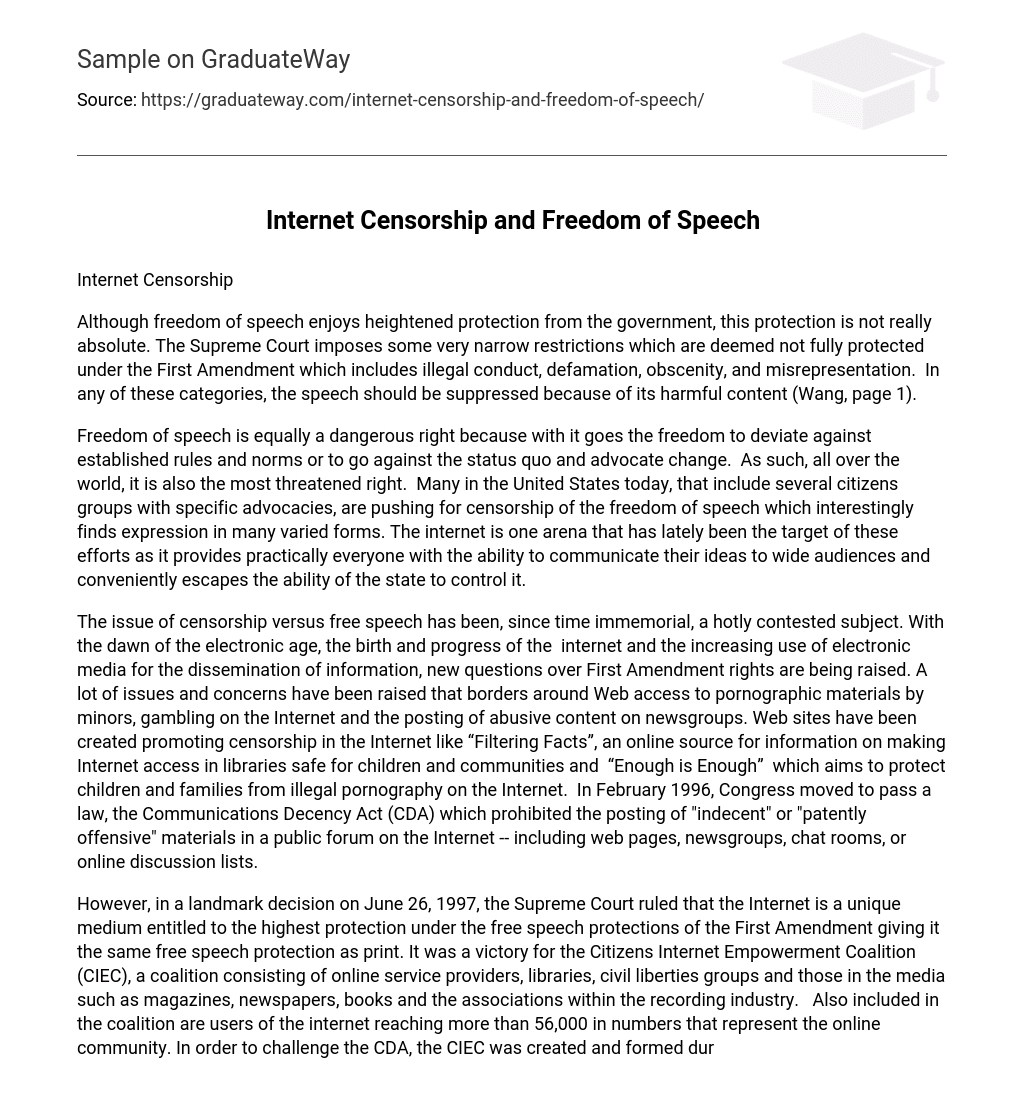Internet Censorship
Although freedom of speech enjoys heightened protection from the government, this protection is not really absolute. The Supreme Court imposes some very narrow restrictions which are deemed not fully protected under the First Amendment which includes illegal conduct, defamation, obscenity, and misrepresentation. In any of these categories, the speech should be suppressed because of its harmful content (Wang, page 1).
Freedom of speech is equally a dangerous right because with it goes the freedom to deviate against established rules and norms or to go against the status quo and advocate change. As such, all over the world, it is also the most threatened right. Many in the United States today, that include several citizens groups with specific advocacies, are pushing for censorship of the freedom of speech which interestingly finds expression in many varied forms. The internet is one arena that has lately been the target of these efforts as it provides practically everyone with the ability to communicate their ideas to wide audiences and conveniently escapes the ability of the state to control it.
The issue of censorship versus free speech has been, since time immemorial, a hotly contested subject. With the dawn of the electronic age, the birth and progress of the internet and the increasing use of electronic media for the dissemination of information, new questions over First Amendment rights are being raised. A lot of issues and concerns have been raised that borders around Web access to pornographic materials by minors, gambling on the Internet and the posting of abusive content on newsgroups. Web sites have been created promoting censorship in the Internet like “Filtering Facts”, an online source for information on making Internet access in libraries safe for children and communities and “Enough is Enough” which aims to protect children and families from illegal pornography on the Internet. In February 1996, Congress moved to pass a law, the Communications Decency Act (CDA) which prohibited the posting of “indecent” or “patently offensive” materials in a public forum on the Internet — including web pages, newsgroups, chat rooms, or online discussion lists.
However, in a landmark decision on June 26, 1997, the Supreme Court ruled that the Internet is a unique medium entitled to the highest protection under the free speech protections of the First Amendment giving it the same free speech protection as print. It was a victory for the Citizens Internet Empowerment Coalition (CIEC), a coalition consisting of online service providers, libraries, civil liberties groups and those in the media such as magazines, newspapers, books and the associations within the recording industry. Also included in the coalition are users of the internet reaching more than 56,000 in numbers that represent the online community. In order to challenge the CDA, the CIEC was created and formed during February of 1996 wherein the latter posited that the Internet is a unique medium of communication and is vastly different from the traditional mass media that entail a broad protection of the First Amendment.
Clamor for censorship of the freedom of speech, whether in broadcast or print media, in television or motion picture, in culture or arts, or in the electronic medium of the Web or the Net, are mostly based on moral and ethical considerations which can be highly subjective depending on the individual’s beliefs, culture, principles, and many other factors. I really do not think that censorship is a solution to the atmosphere of violence, obscenity and other social concerns pervading American society today. Censorship may even be harmful as it gives a temporary feeling of false security. Freedom of speech is just among the many rights guaranteed under the Constitution. The risk, however, is allowing our other rights to be diminished in the end
References:
Center for Democracy & Technology (2008). Communications Decency Act. Retrieved November 16, 2008 from <http://www.cdt.org/speech/cda/ >.
Wang, Xinyi (2001). “Freedom of Speech in the United States Constitution.” Perspectives





